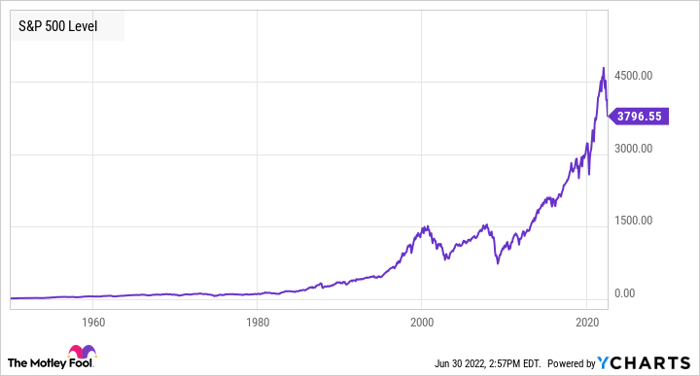This article was originally published on Fool.com. All figures quoted in US dollars unless otherwise stated.
There's no such thing as a guarantee when it comes to investing. Whether you're investing time, money, or energy, there's always a risk that things won't work out.
That being said, there are some things that are no-brainers for investors looking to get ahead.
In a rough stock market, here are five investments you can make that are nearly guaranteed to produce net positive returns in your life.
1. The S&P 500
It might not be tomorrow, next week, or even next year, but if history is any indicator, the S&P 500 is headed to higher ground over the long run.
When the market turns sour, like it has recently, it's helpful to look at a historical chart of the S&P 500 for some much-needed perspective.
The takeaway is pretty simple: Investing in the 500 largest companies in the U.S. proves to be a net positive if you give it enough time.
2. Side hustles
Side hustles are one of the easiest ways to increase your income. From walking dogs to driving for Uber or Lyft, imagine what you could do with an extra 10% to 15% more every month. That money could mean a much-needed vacation, strengthening your emergency fund, or extra cash to invest for your future.
Side hustles are also a great entryway into entrepreneurship. The risk of quitting your job to start your own businesses is high, but working a side hustle on the weekends is relatively low risk, and if you're willing to put in the work, it certainly can become a full-time gig someday.
Twitter, Slack (now part of Salesforce), and Craigslist are some notable companies that started off as side hustles for their founders.
3. A higher salary
One of the quickest ways to increase your wealth is to increase your salary. The problem is, most people approach this investment the wrong way.
Instead of simply asking for a raise, you should approach the issue in a more strategic way.
Even if your boss is sympathetic to predicaments such as higher costs of living, companies are in the businesses of making money, so the boss will likely not be compelled to give you a raise. You're much more likely to be successful by pitching an idea to your boss that will add value to the business and make everyone's life easier. The two most obvious ways of doing this are cutting costs and increasing sales.
The simple pitch might look something like this: "If I can accomplish X, which will bring in more money for the company, can I get a raise?"
You'll have to be creative, but if you can figure out how to add more value to the business, a higher salary is likely to follow.
4. Investing knowledge
Stock market crashes can be humbling. Many decide to leave the markets for good, but smart investors use bear markets as an indication to get smarter about investing.
Increasing your knowledge on topics like writing an investment thesis, analyzing financial news, and researching stocks will have a huge positive impact on your long-term portfolio performance.
5. Things that bring you joy
While it might not show up on a profits and losses chart, investments in things that bring enjoyment into your life can certainly pay dividends for your health and overall happiness.
Pursuing new hobbies, spending time with family and friends, or starting new non-work-related projects not only adds variety and balance to your life, but it also lets your brain get away from the markets for a while. And for long-term investors, getting away from the constant short-term-focused stock market coverage can be a powerful advantage.
Whenever we allocate resources, we are investing
Buying stocks or other assets is not the only definition of investing. Whenever you allocate resources into something, that's an investment. Along with money, our most precious resources are time and energy, and the way we spend them can have massive implications for our overall health and happiness.
The Oracle of Omaha, Warren Buffett, said it best: "The most important investment you can make is in yourself."
Investing in yourself is at the heart of becoming smarter, happier, and richer.
This article was originally published on Fool.com. All figures quoted in US dollars unless otherwise stated.










